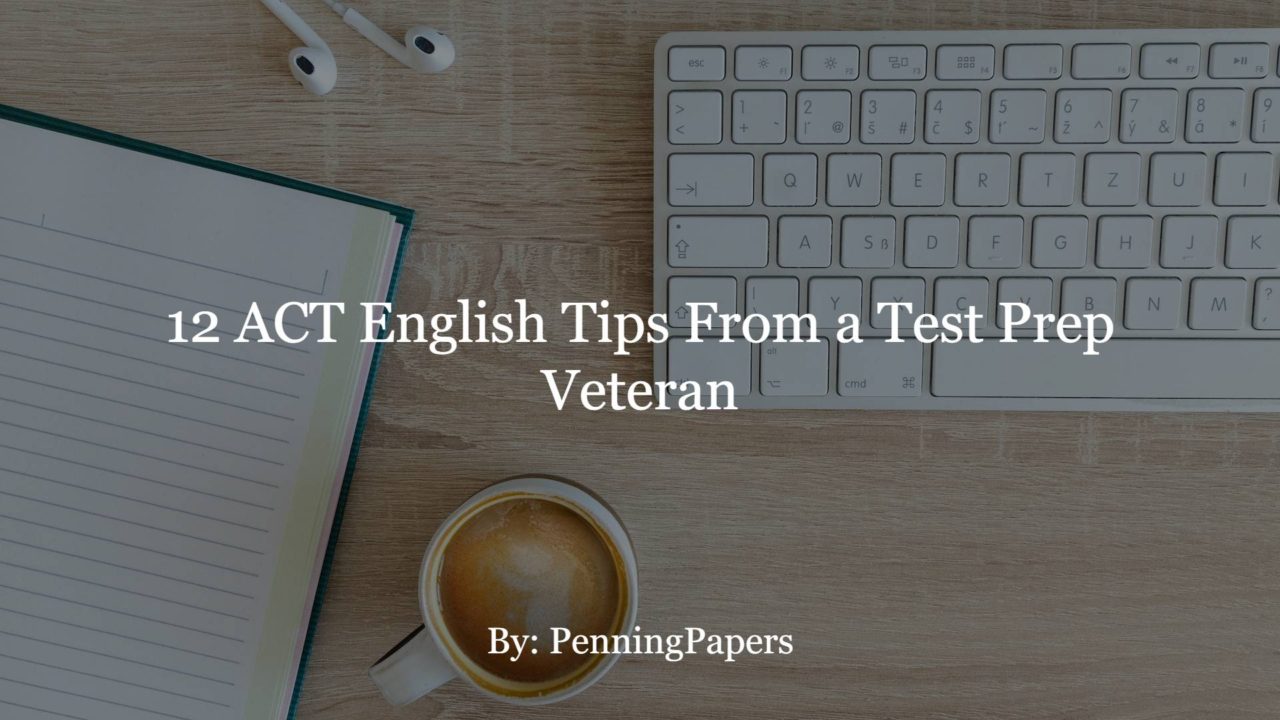If you’re reading this article, chances are you’ve already read a few other articles about ACT English tips. And, well, let’s be real. Some of them are right. They tell you how to get the right answers, how to avoid the wrong ones, etc.
But, this is going to be a bit different.
As someone who used to work at a test prep center in Southern California, I had the luxury of seeing just about everything.
I’ve seen the smartest students who just couldn’t bump that 35 ACT to a 36. I’ve seen people jump from scoring 20s to 30s within weeks. I’ve seen and helped students studying for the ACT with ADHD and test anxiety. I’ve worked with kids with Dyslexia.
I’ve had parents try to sue the College Board for giving their child a 32 rather than a 36.
Yeah… I know.
Long story short, I’ve worked with just about every student you could imagine. And, regardless of whether they’re international students struggling with English, students with learning disabilities, gifted kids with test anxiety, or students with parents who are Karens, I’ve noticed one very interesting thing:
The same ACT English tips I give almost always work with just about every student.
Well, it doesn’t just work. It actually helps students boost their scores significantly in a short amount of time. This helps them avoid necessarily long tutoring sessions and helps them achieve results FAST.
Okay, before I start tooting my own horn too much, I need to give credit where credit is due. The ACT English section is actually one of the easiest parts to see significant improvement on. This is because the rules in English are limited, and can be easily studied with proper work ethic and due diligence to ensure “minimum effort.”
Of course, this excludes international students who have English as a second language. They may have a harder time; but, they can still easily increase their score significantly!
Moreover, the ACT English section on the ACT is very, very similar to the Writing and Language section of the SAT. Roughly speaking: if you can do well in the ACT English section, you can do well in the SAT one as well!
One final point before we get to the tips.
If you haven’t purchased it already, we HEAVILY RECOMMEND using the Grammar Girl’s Ultimate Guide as your ACT English bible. It’s cheaper than the other fancy Grammar books. Yet, it’s hands down the best book for explaining basic ACT English rules such as independent clauses and semicolons in a way that’s easy to understand for students who HATE the ACT.
Note: I’ve made the Grammar Girl’s Ultimate Guide an affiliate link. Your purchase of the book gives us a small percentage, and helps fund the coffee I buy to keep me awake while I help students with their college admissions essays! So, thank you!
Okay. With that out of the way, let’s get to the 12 ACT English tips I’ve taught that increased scores by a huge margin!
Table of Contents
- 12 ACT English Tips From a Test Prep Veteran
- ACT English Tip # 1: The Almighty Power of Time Tracking.
- ACT English Tip # 2: Creating a Custom ACT Studying Schedule.
- ACT English Tip # 3: Pomodoro Method for ACT Studying.
- ACT English Tip # 4: ACT Coaching is Better Than Tutoring. Hands Down.
- ACT English Tip # 5: …Writing?
- ACT English Tip # 6: Don’t Be Redundant!
- ACT English Tip # 7: Independent Clauses and Dependent Clauses.
- ACT English Tip # 8: Coordinating Conjunctions as FANBOYS.
- ACT English Tip # 9: Subordinating Conjunctions.
- ACT English Tip # 10: Semicolons and Their Limitations in the ACT.
- ACT English Tip # 11: Appositives! Appositives Everywhere!
- ACT English Tip # 12: Short is King. Short Kings.
Professional ACT Coaching
- Get a 33+ ACT Score
- FAST results.
- 6 Weeks Coaching.
- Professional Test Prep Instructors From UPenn, NYU, Cornell, and USC.
- Flexible Payment Budgets
Contact us. We'll get to you within 24 hours.
12 ACT English Tips From a Test Prep Veteran
ACT English Tip # 1: The Almighty Power of Time Tracking.

As an ACT instructor, I’ve discovered that most students are working at only a fraction of their potential efficiency.
This is something everyone knows.
When they’re studying for the ACT in the library or practicing at home, they’re often distracted by phones, social media, and other externalities.
All it takes is one tempting stimuli such as the smell of delicious Chinese takeout to burst the bubble of focus.
Then, what happens? What happens when focus bursts?
Well, it makes us lose track of how much time we ACTUALLY work. We don’t know how much effort we’re REALLY putting into studying for the ACT.
So, I’ve provided my students with a simple time-tracking system that… well, tracks time.
All you need is a timer and a blank sheet of paper.
Use the timer to keep track of the amount of time you’re working in increments. Then, write it on the paper. As an example, let’s say you stay focused on studying your ACT vocabulary for 20 minutes. Then, you eat dinner. Then, you study for another 20 minutes. You would write 20 minutes 2 times in the paper, which adds up to 40 minutes of studying in total.
It’s important to record your work in increments. So, how much work you did you do in increments of 15 minutes, 20 minutes, 25 minutes, etc? Knowing this can help you maintain focus within those periods and more easily track how much time has passed rather than expecting that your focus will just be constant from beginning to end.
ACT English Tip # 2: Creating a Custom ACT Studying Schedule.

The next step to mastering the ACT English section is to create a custom studying schedule.
This is something that is absolutely vital for any kind of long-term project.
The ACT is a long-term project. Although the test only lasts for a few hours, the journey of studying, test-taking, and studying again lasts for months if not years. So, you will need an organized schedule week to week and month to month in order to portion out your time properly.
Now, you can learn interesting and cool tips and tricks for the ACT English section that works. And, we do cover them in some of the other tips below. But, what truly helps you master the ACT English section is in getting your studying schedule in order.
By consistently studying and following the schedule you set yourself to do, you’ll be able to do infinitely more than any quirky or unique tips can.
To make an ACT English studying schedule, you need to negotiate with yourself.
Here’s an example:
Let’s say that you have to make a schedule for this upcoming week’s Monday – Friday. There are things you may “want to do” like going to the gym, studying for 3 hours, catching up on homework, and running a marathon. But, we all know you’re not going to do that. We can’t do that. No one can except for the 1% of the 1%.
All that will happen is you’ll crack the whip and force yourself to do things you don’t want to do; so, your mind will rebel and you’ll go against the very studying schedule you set up.
So, what’s the solution?
Well, you need to create a studying schedule that fits enough time into the ACT that you ACTUALLY agree with it.
This is what it means to negotiate with yourself. You speak to yourself as if you were a separate person who procrastinate like everyone else and you see what you’re actually capable of doing and are willing to do.
Of course, there are more advanced ways to portion your time and better ways that optimize your chances of success. But, for now, this is the basics.
If you do want to create a custom study schedule for the ACT, we can certainly help with that. By scheduling a free consultation with us, we can help you craft a schedule that will suit your needs and maximize your score with minimal effort.
ACT English Tip # 3: Pomodoro Method for ACT Studying.

The Pomodoro Method is one of the most common work methods out there —and for good reason. In addition, it’s used commonly used as a method of productivity for students with ADHD.
The ACT is, as we mentioned previously, a “long game.” Unlike other tests, the ACT will take many months and sometimes even years before its takers can earn a satisfactory score that is competitive for college admissions.
So, you’ll need to study multiple times a week for a long period of time. This demands two things:
- Consistency.
- Long-term tolerance for boredom.
That’s not easy. In fact, most working adults still struggle with this.
Fortunately, I found the Pomodoro method works wonders for my students. It helps them dedicate parts of their day to studying, they can maintain that consistency, and they can tolerate boredom for longer periods of time.
This primarily works because the Pomodoro is a bell system.
It allows students to have a break. But, it also signals to them when to start working and when to relax. They can successfully alternate between work and play without fail; and, they can still meet the goals they set without getting distracted.
In a broader sense…
The Pomodoro method works because it puts the burden of responsibility of motivation and puts it on a timer. You don’t need to motivate yourself to work because the timer just tells you when to work and when to take a break.
If you’re studying for a high score on the ACT and you’re struggling with ADHD, you may have a hard time motivating yourself to study because you have a low tolerance for boredom. With the Pomodoro method, you don’t have to be worried about boredom.
Surrendering control to the timer allows you to follow through with the work, as it makes the decisions for you whilst taking control away from your “monkey brain”. That’s an important key point. Remember: surrender control. The more you let go of control, the more control you’ll have over your study sessions.
ACT English Tip # 4: ACT Coaching is Better Than Tutoring. Hands Down.

This is a controversial point. But, it’s important to discuss.
Before I started PenningPapers, I used to work as a test prep instructor. I taught both SAT and ACT. And, well, I discovered something odd about the test prep tutoring world.
Test prep tutoring for ACT and SAT does in fact “work”; but, it’s not as effective as people really think!
The kind of things that happen during tutoring is mostly practice and explaining questions that are confusing. This helps students boost their score by a few points; and, they can even increase by a few hundred points on the SAT or over 5 points on the ACT if they’re lucky. But, the amount of money needed to pay for tutoring does NOT justify the amount of score increase.
For instance, most test prep summer programs in Southern California average about $2,800-$5,000 for quality tutoring. For hourly rates, they can range from $50-$500. But, even then, the amount of help you get from tutoring is limited.
If you truly want to increase your ACT score, you should not get a tutor. You can learn what a tutor teaches you anyway. You should also not rely on self-study alone since your mind is prone to procrastination and human error. Thus, the best way to improve your ACT score is through ACT coaching.
An ACT coach takes on a more holistic approach to test prep. They’re not just trying to explain why answers are correct or incorrect. They’re studying the way you think and learn, and using that information to provide you with the best methods for learning.
This is the most optimal method, as it actually digs deeper into the root of your inability to earn higher scores. Instead of focusing on whether a question is answered correctly or incorrectly, a coach can help you reorient your mindset and thinking process to better answer the set of all ACT questions.
This is actually what I did when I worked at the prep center back in Southern California. And, it’s why I managed to help students achieve 33+ scores on the ACT in such a short amount of time. I even teach this method to my coaches now, and they use the same strategy to help my current clients.
If you’re ever interested in trying out coaching for yourself, feel free to schedule a free consultation with me to discuss the details! I can get back to you within 24 hours, and provide you with a general feel for what the program is like!
ACT English Tip # 5: …Writing?

Yeah, this is probably the least fun tip in this article. But, bear with us here!
In order to truly comprehend and grasp the content in the ACT English section, you need to understand the concepts on a deeper level.
So, you can’t just get all the right answers by preparing for the content of the test. You need to use the content on the test in your everyday life. Knowing grammar and implementing grammar are completely different things.
And, once you start using the rules of grammar and writing in your everyday life, you’ll have a MUCH EASIER time scoring high on the ACT English section.
This means…
*drumroll*
You need to write more!
That’s right. In order to truly improve in the ACT English section quickly, you need to use the grammar and writing rules you learned and write more with them!
Asking your teacher for an extension through email? Better send that with semicolons and colons! Texting your friends and asking them to hang out and get dinner with you? Don’t forget to properly separate your independent and dependent clauses with the right punctuation. Writing something in your personal planner and journal? Don’t misuse your gerunds.
Oh, and don’t forget to write often in your everyday life as a whole. Write your thoughts in complete and sophisticated sentences in a journal. They don’t have to be complete essays. But, the more you practice the rules of English through your writing, the faster you’ll improve on the ACT English section!
ACT English Tip # 6: Don’t Be Redundant!

This one is quite simple.
Don’t use more words than is absolutely necessary to convey the same message.
Redundancy isn’t technically wrong grammatically. However, it’s a stylistic preference most teachers would advise against. And, the ACT English section is no exception. They prefer that you avoid saying the same thing in more words than needed.
Let’s take a look at an example below.
“If the human brain were so simple that we could understand it, we would be so simple that we couldn’t.”
A. NO CHANGE
B. we would be so simple we couldn’t!
C. we would be so simple that we couldn’t understand the mind!
D. we’d be so simple in comprehension that we couldn’t!
In this case, the correct answer is A.
Now, we know what you may be thinking.
Answers C and D are grammatically correct, right? And, well, yeah! They are! However, just because they’re grammatically correct does NOT mean they’re the MOST CORRECT choice.
Despite A, C, and D being grammatically correct, answer A is the least redundant version of the sentence. The ACT tests students on how often they include unnecessary wordiness in their answers.
So, you always want to pick the answer that retains the same ideas as the original statement without adding unnecessary words.
ACT English Tip # 7: Independent Clauses and Dependent Clauses.

The next few tips here are going to be more focused on the grammar elements of the ACT. Because these rules are so simple to master, we felt it necessary to add them to this list.
Let’s start with independent and dependent clauses.
Here’s the gist: independent clauses are strings of words that can stand on their own as a sentence, and dependent clauses are strings of words that can’t.
Alright, now here are a few other general rules.
- Independent clauses have a subject and a predicate.
- The cat crossed the road.
- Gamers who use cheat codes suffer from a debilitating condition called “skill issue.”
- Dependent clauses don’t.
- Because my chemistry teacher would not round my grade up.
- Judging by the look on their faces.
- Independent clauses can be joined by other independent clauses by using a period or a semicolon.
- The cat with the hat sat on the mat; he looked very comfortable.
- The cat also said something else to us. “I’m not a fan of cheesy rhymes.”
- Independent clauses can be joined by other dependent clauses if and only if the dependent clause resides within another independent clause.
- I asked whether Calliope would be interested in attending the expo; because of the overwhelming smell of body odor, she refused.
- I don’t like to attend comedy shows; however, if someone is performing who has a joke more creative than another sex joke, I would be inclined to attend one.
There are going to be other things you’ll need to consider such as whether commas or semicolons can be used with independent or dependent clauses.
But, there’s a catch.
You should NOT learn all of this in one go.
If you’re wondering why this is, let me explain.
The problem with learning EVERYTHING about independent and dependent clauses is that it’s a bit like swimming. Normally, if you ask someone who is a capable swimmer, they don’t really need to think about the process of swimming. However, often because they learned to swim by learning the multiple muscle movements that go into the procedure. Swimming mechanics are complicated; but, by exercising certain movements and learning them one at a time, a newbie can swim without even really thinking.
This is the same process as learning grammar.
You can learn about how the semicolons, commas, hyphens, etc come into the equation in relation to independent and dependent clauses. However, you’ll likely overwhelm yourself.
You must learn and familiarize yourself with the rules of independent and dependent clauses one at a time before you’re ready to get to the more complex forms of sentence structure.
For someone who has taught grammar all his life, I have no problem joining independent clauses and using punctuation to write creative sentence structures. However, that’s not always easy for everyone. This takes time and patience.
But, when you take it slow and steady, you’ll be impressed with how much progress you actually make!
ACT English Tip # 8: Coordinating Conjunctions as FANBOYS.

Coordinating conjunctions are words that join two independent clauses. They can be at the start of a sentence, or in the middle of it.
These are the known coordinating conjunctions.
- For
- And
- Nor
- But
- Or
- Yet
- So
You can memorize this list of coordinating conjunctions using the acronym FANBOYS.
Now, this brings up a strange situation.
“I was told I can’t start a sentence with “but”; yet, here you are telling us that you can start a sentence with a coordinating conjunction! Does that mean our teachers lied to us?”
And the answer to that is… well, yeah. Pretty much.
Here’s a cool history lesson. Your teachers actually had to lie to you about starting your sentences with “But” or “Because.” Why? Well, it’s because most people actually don’t know how to start a sentence with “But” or “Because.”
You’ll actually find throughout your experience studying for the ACT English section that there is a multitude of rules that your teachers have lied to you about. They did this as a way of avoiding mistakes in general; and, it’s to prevent you from having to learn confusing coordinating conjunction rules that might have been too complex for 2nd-grade minds.
ACT English Tip # 9: Subordinating Conjunctions.

Subordinating conjunctions join an independent clause with a dependent clause.
The most common subordinating conjunction is “Because.”
But, there are other subordinating conjunctions to note. Here are a few.
- As
- Since
- For
- Though
- Unless
- So
These subordinating conjunctions are often placed after a comma. However, they can also be placed at the beginning of a sentence so long as the whole sentence reads as an independent clause.
Here are some examples.
- Because of her lack of popularity, Susan lost the election.
- I didn’t like those burgers, for they were too greasy.
- You can eat a salad to lose weight; that is, unless you’re adding buckets of mayo to it.
ACT English Tip # 10: Semicolons and Their Limitations in the ACT.

Semicolons join two independent clauses together to make one sentence.
Remember, an independent clause needs a subject and a predicate in order for it to stand on its own. So, let’s take a look at an example below.
- I want to finish my homework; there’s still so much to do.
This is a simple example. But, there are more complex ones. Take a look at the example below.
- I’m going to walk to the store; but, I’m also concerned about the pain in my knees when walking.
This includes two independent clauses. But, the second independent clause contains a comma within it. It can look confusing at first; though, when you get enough exposure to independent and dependent clauses, it’ll be simpler to differentiate.
Now, there’s a catch.
Semicolons normally require you to bind two independent clauses together when they’re related to one another. They need to be similar enough in context to be deemed “appropriate.”
So, here’s an example of a semicolon used in an inappropriate way.
- Cakes are better than ice cream; having Spiderman’s powers would be great for commuting to work.
Obviously, cakes and Spiderman have nothing to do with one another; but, in this next example, the semicolon is used appropriately because the topics are aligned.
- The museum is still looking to hire new employees; if you want to apply, sign up with this form.
Note that the ACT does NOT consider whether a semicolon is appropriate or not. They ONLY consider whether a semicolon is used to separate two independent clauses. That’s it!
ACT English Tip # 11: Appositives! Appositives Everywhere!

In the ACT, the appositive is a string of words that often explain or elaborate on the subject before it. It is also often surrounded by two commas or em dashes.
Here is an example of it used with commas and em dashes.
- If you’re in high school, where drama and troubling rumors run rampant, you’ll need to be wary of unsavory and toxic individuals.
- The people of the forest —who rarely show themselves— made a surprising entrance during the king’s dinner party.
In the ACT, you’ll need to know how to use and identify appositives becasue they’re used in pretty much every other question.
They’re very common all across the board
So, even if a question is strictly about the use of independent and dependent clauses, you’ll still need to know how to identify and use appositives since some of the answers provided may test your ability in identidying it.
ACT English Tip # 12: Short is King.

In the ACT English section, keeping things concise is often always the best way to go.
In short, short is king.
You go, short kings!
Okay, okay. Sorry. We just wanted an excuse to empower fellow short kings out there. If you’re of below-average height, we hope you earn a 36 ACT score.
Anyway, let’s actually start discussing why short is king for the ACT English section.
In the English section, keeping things concise and short whilst communicating the most content is the “correct” path. Use as few words as possible without compromising the meaning of your sentences.
As a general rule, if you CAN remove extra words, punctuation, etc, you SHOULD.
Alright, let’s take a look at an example:
“Judging by the engravings on this utensil, I have my doubts this “artifact” is anything other than contemporary.”
A. NO CHANGE
B. is anything but contemporary.
C. is anything other than contemporary and modern design.
D. is anything but contemporary or of the current times’ craftsmanship.
Remember. Short is sweet. Short is king.
So, the correct answer here would be B. B achieves the same meaning as A with fewer words. And, answers C and D essentially repeat the same words as contemporary. They say “modern design” and “current times’ craftsmanship”; but, these are all the same as “contemporary” and are therefore unnecessarily long.
Note: Just like in this test question, many questions will have all answers be grammatically correct. However, just because they’re grammatically correct does not mean that they’re the MOST correct. You still need to choose the most appropriate answer; and, in this case, you choose the shortest.
If you have any other questions about the ACT English section, would like more ACT English tips in general, or would like to seek help with an ACT coach, consider spekaing with us for a free consultation. We’ll get back to you within 24 hours and match you with a great coach who can help increase your score for a fraction of the time and money!

